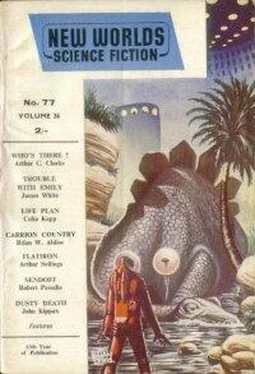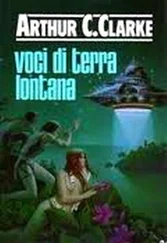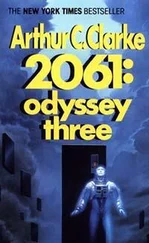Arthur Clarke - Who's There?
Здесь есть возможность читать онлайн «Arthur Clarke - Who's There?» весь текст электронной книги совершенно бесплатно (целиком полную версию без сокращений). В некоторых случаях можно слушать аудио, скачать через торрент в формате fb2 и присутствует краткое содержание. Год выпуска: 1957, Издательство: Nova Publications Ltd., Жанр: Фантастика и фэнтези, на английском языке. Описание произведения, (предисловие) а так же отзывы посетителей доступны на портале библиотеки ЛибКат.
- Название:Who's There?
- Автор:
- Издательство:Nova Publications Ltd.
- Жанр:
- Год:1957
- ISBN:нет данных
- Рейтинг книги:5 / 5. Голосов: 1
-
Избранное:Добавить в избранное
- Отзывы:
-
Ваша оценка:
- 100
- 1
- 2
- 3
- 4
- 5
Who's There?: краткое содержание, описание и аннотация
Предлагаем к чтению аннотацию, описание, краткое содержание или предисловие (зависит от того, что написал сам автор книги «Who's There?»). Если вы не нашли необходимую информацию о книге — напишите в комментариях, мы постараемся отыскать её.
Who's There? — читать онлайн бесплатно полную книгу (весь текст) целиком
Ниже представлен текст книги, разбитый по страницам. Система сохранения места последней прочитанной страницы, позволяет с удобством читать онлайн бесплатно книгу «Who's There?», без необходимости каждый раз заново искать на чём Вы остановились. Поставьте закладку, и сможете в любой момент перейти на страницу, на которой закончили чтение.
Интервал:
Закладка:
Who’s There?
by Arthur C. Clarke
When Satellite Control called me, I was writing up the day’s progress report in the Observation Bubble—the glass-domed office that juts out from the axis of the Space Station like the hubcap of a wheel. It was not really a good place to work, for the view was too overwhelming. Only a few yards away I could see the construction teams performing their slow-motion ballet as they put the station together like a giant jigsaw puzzle. And beyond them, twenty thousand miles below, was the blue-green glory of the full Earth, floating against the ravelled star clouds of the Milky Way.
“Station Supervisor here,” I answered. “What’s the trouble?”
“Our radar’s showing a small echo two miles away, almost stationary, about five degrees west of Sirius. Can you give us a visual report on it?”
Anything matching our orbit so precisely could hardly be a meteor; it would have to be something we’d dropped-perhaps an inadpquately secured piece of equipment that had drifted away from the station. So I assumed; but when I pulled out my binoculars and searched the sky around Orion, I soon found my mistake. Though this space traveller was man-made, it had nothing to do with us.
“I’ve found it,” I told Control. “It’s someone’s test satellite cone-shaped, four antennae, and what looks like a lens system in its base. Probably U.S. Air Force, early nineteen-sixties, judging by the design. I know they lost track of several when their transmitters failed. There were quite a few attempts to hit this orbit before they finally made it.”
After a brief search through the files, Control was able to confirm my guess. It took a little longer to find out that Washington wasn’t in the least bit interested in our discovery of a twenty-year-old stray satellite, and would be just as happy if we lost it again.
“Well, we can’t do that ,” said Control. “Even if nobody wants it, the thing’s a menace to navigation. Someone had better go out and haul it aboard.”
That someone, I realized, would have to be me. I dared not detach a man from the closely knit construction teams, for we were already behind schedule—and a single day’s delay on this job cost a million dollars. All the radio and TV networks on Earth were waiting impatiently for the moment when they could route their programmes through us, and thus provide the first truly global service, spanning the world from Pole to Pole.
“I’ll go out and get it,” I answered, snapping an elastic band over my papers so that the air currents from the ventilators wouldn’t set them wandering around the room. Though I tried to sound as if I was doing everyone a great favour, I was secretly not at all displeased. It had been at least two weeks since I’d been outside; I was getting a little tired of stores schedules, maintenance reports, and all the glamorous ingredients of a Space Station Supervisor’s life.
The only member of the staff I passed on my way to the air lock was Tommy, our recently acquired cat. Pets mean a great deal to men thousands of miles from Earth, but there are not many animals that can adapt themselves to a weightless environment. Tommy mewed plaintively at me as I clambered into my spacesuit, but I was in too much of a hurry to play with him.
At this point, perhaps I should remind you that the suits we use on the station are completely different from the flexible affairs men wear when they want to walk around on the moon. Ours are really baby spaceships, just big enough to hold one man. They are stubby cylinders, about seven feet long, fitted with low-powered propulsion jets, and have a pair of accordion-like sleeves at the upper end for the operator’s arms. Normally, however, you keep your hands drawn inside the suit, working the manual controls in front of your chest.
As soon as I’d settled down inside my very exclusive spacecraft, I switched on power and checked the gauges on the tiny instrument panel. There’s a magic word, “FORB’, that you’ll often hear spacemen mutter as they climb into their suits; it reminds them to test fuel, oxygen, radio, batteries. All my needles were well in the safety zone, so I lowered the transparent hemisphere over my head and sealed myself in. For a short trip like this, I did not bother to check the suit’s internal lockers, which were used to carry food and special equipment for extended missions.
As the conveyor belt decanted me into the air lock, I felt like an Indian papoose being carried along on its mother’s back. Then the pumps brought the pressure down to zero, the outer door opened, and the last traces of air swept me out into the stars, turning very slowly head over heels.
The station was only a dozen feet away, yet I was now an independent planet—a little world of my own. I was sealed up in a tiny, mobile cylinder, with a superb view of the entire universe, but I had practically no freedom of movement inside the suit. The padded seat and safety belts prevented me from turning around, though I could reach all the controls and lockers with my hands or feet.
In space, the great enemy is the sun, which can blast you to blindness in seconds. Very cautiously, I opened up the dark filters on the “night” side of my suit, and turned my head to look out at the stars. At the same time I switched the helmet’s external sunshade to automatic, so that whichever way the suit gyrated my eyes would be shielded from that intolerable glare.
Presently, I found my target—a bright fleck of silver whose metallic glint distinguished it clearly from the surrounding stars. I stamped on the jet-control pedal, and felt the mild surge of acceleration as the low-powered rockets set me moving away from the station. After ten seconds of steady thrust, I estimated that my speed was great enough, and cut off the drive. It would take me five minutes to coast the rest of the way, and not much longer to return with my salvage.
And it was at that moment, as I launched myself out into the abyss, that I knew that something was horribly wrong.
It is never completely silent inside a spacesuit; you can always hear the gentle hiss of oxygen, the faint whirr of fans and motors, the susurration of your own breathing—even, if you listen carefully enough, the rhythmic thump that is the pounding of your heart. These sounds reverberate through the suit, unable to escape into the surrounding void; they are the unnoticed background of life in space, for you are aware of them only when they change.
They had changed now; to them had been added a sound which I could not identify. It was an intermittent, muffled thudding, sometimes accompanied by a scraping noise, as of metal upon metal.
I froze instantly, holding my breath and trying to locate the alien sound with my ears. The meters on the control board gave no clues; all the needles were rock-steady on their scales, and there were none of the flickering red lights that would warn of impending disaster. That was some comfort, but not much. I had long ago learned to trust my instincts in such matters; their alarm signals were flashing now, telling me to return to the station before it was too late…
Even now, I do not like to recall those next few minutes, as panic slowly flooded into my mind like a rising tide, overwhelming the dams of reason and logic which every man must erect against the mystery of the universe. I knew then what it was like to face insanity; no other explanation fitted the facts.
For it was no longer possible to pretend that the noise disturbing me was that of some faulty mechanism. Though I was in utter isolation, far from any other human being or indeed any material object, I was not alone. The soundless void was bringing to my ears the faint but unmistakable stirrings of life.
In that first, heart-freezing moment it seemed that something was trying to get into my suit—something invisible, seeking shelter from the cruel and pitiless vacuum of space. I whirled madly in my harness, scanning the entire sphere of vision around me except for the blazing, forbidden cone towards the sun. There was nothing there, of course. There could not be—yet that purposeful scrabbling was clearer than ever.
Читать дальшеИнтервал:
Закладка:
Похожие книги на «Who's There?»
Представляем Вашему вниманию похожие книги на «Who's There?» списком для выбора. Мы отобрали схожую по названию и смыслу литературу в надежде предоставить читателям больше вариантов отыскать новые, интересные, ещё непрочитанные произведения.
Обсуждение, отзывы о книге «Who's There?» и просто собственные мнения читателей. Оставьте ваши комментарии, напишите, что Вы думаете о произведении, его смысле или главных героях. Укажите что конкретно понравилось, а что нет, и почему Вы так считаете.











